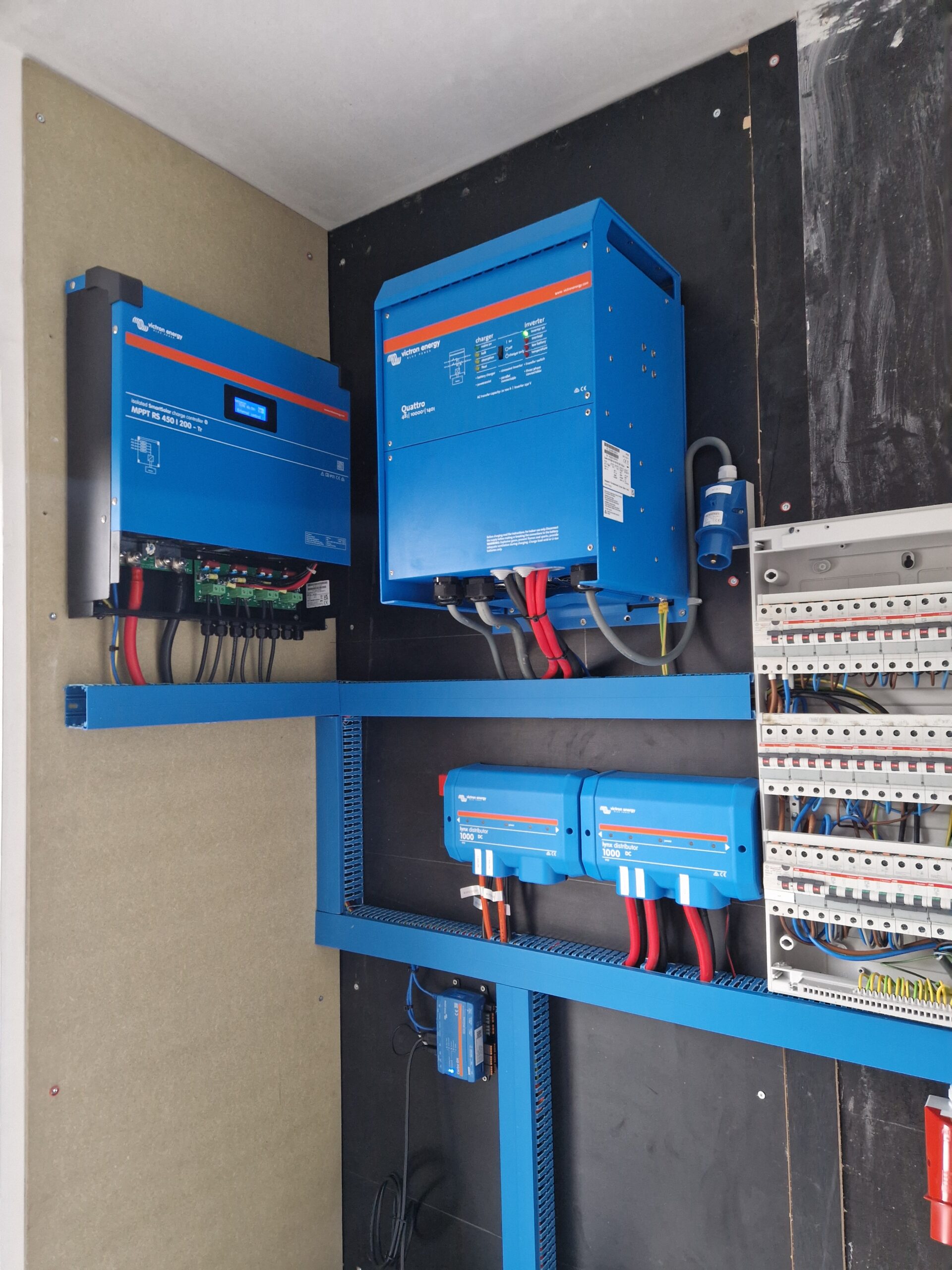Off-grid living in Belgium
When we talk about off-grid living, we mean living without a connection to a utility: a water, sewage, gas or electricity connection. We see this mostly in campervans, mobile homes, boats and in the Tiny house world.
When we talk about off-grid living, we mean living without a connection to a utility: a water, sewage, gas or electricity connection. We see this mostly in campervans, mobile homes, boats and in the Tiny house world.

Wire-up specialises in off-grid electrical systems. These systems are designed to operate autonomously, without a power grid nearby.
These systems are used in completely off-grid homes, but also in homes that do have water or other supplies. This makes them off-grid on an electrical level only.
An off-grid electrical system is an electrical system that is completely autonomous. It generates its own energy, stores it and thereby provides a continuously usable electrical system.
An off-grid electrical installation is made up of 3 main components:
- The battery
- The energy source (solar panels, wind turbine, generator, ...)
- The inverter
Within our system, the battery determines the maximum amount of electricity that can be stored in our system. Eg: a 48 Volt battery with a capacity of 200 Ampere has a theoretical capacity of 9600 Watts.
We can then start using this power. If we connect a 100-watt consumer, it will be able to keep working for 96 hours (in theory, in practice, however, there are still some loss factors).
The energy source can consist of several things, each working on its own. In most cases, they can also be combined with each other. The most commonly used energy source in an off-grid system is solar energy through solar panels. In addition, wind energy or water turbines can also be used. As a back-up for the whole system, a generator is often used to ensure that power is always available in the installation.
The inverter(s) is the link in the whole thing. It is used to go from the energy source to stabilise the current and voltage in order to charge the battery in a healthy way. It is also used to start converting current coming from the battery from a DC voltage to AC voltage (which we are familiar with in our standard electricity grid) in order to use all our known electrical appliances in our off-grid system. Practical example
In Belgium, we generally have a very reliable power grid. Unlike other countries, where the power goes off all the time, here we can enjoy a grid that only experiences a dip once every few months, which is then often not even noticed. Our grid is also present in many places, so you almost have to start looking for places where it cannot be found already.
Yet there are various reasons for installing an off-grid system in Belgium. Obviously when we are talking about mobile applications such as campers, boats, ambulances, ... But we can also provide an off-grid system in a classic house, where there is a grid connection. With current energy prices, this is not even that crazy anymore. The advantage of an off-grid system is that when you buy it, you have a very good overview of the total cost price over a period of 25 to 30 years. In other words, you invest once in a complete system, from which you will then only have some maintenance costs and possibly the consumption of a diesel generator.
By installing a Wire-Up off-grid system, you will get a super good overview of how much energy you consume at what times. A consequence of the monitoring, is that you can easily start saving on your energy consumption and you will therefore become more energy conscious. You will also be instantly rewarded for this. The less energy you use, the less energy is needed and, as a result, the cheaper your installation will be. A win for the wallet, which is also good for the environment!
find the full legislation here.
For mobile off-grid applications, we use the same inverters as in an off-grid home. However, the solar panels, batteries and other components will often be different. Not every solar panel is suitable for installation on an RV or boat. And certainly not every battery can cope with the vibrations involved when you drive a camper on the better cobblestone road in Belgium or turn into a beautiful country road in the French Provence, let alone want to sail through a storm on the Atlantic Ocean. More info
Besides off-grid, we also have very many semi-grid electrical installations today. The basis of such a semi-grid installation is exactly the same as an off-grid system and can therefore also operate completely off-grid. Only here, we use the grid as backup for our installation. As a result, we are armed against power failures, we can work with a dynamic energy tariff and have numerous other advantages. You can read more about these systems in one of our future blog posts. Additional Info